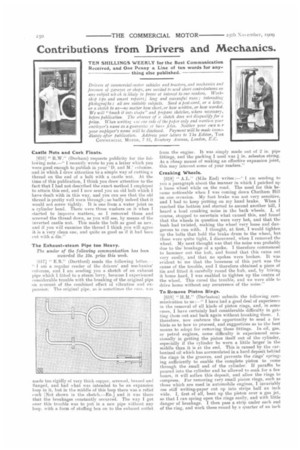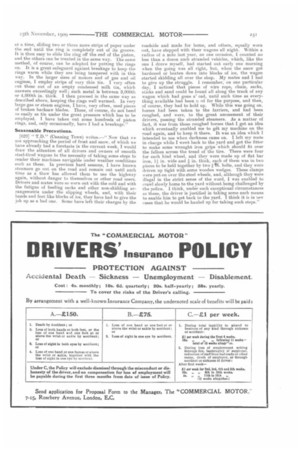Contributions from Drivers and Mechanics.
Page 18

Page 19

If you've noticed an error in this article please click here to report it so we can fix it.
TEN SHILLINGS WEEKLY for the Best Communication Received, and One Penny a Line of ten words for any thing else published.
Drivers of commercial-motor vehicles and tractors, and mechanics and foremen of garages or shops, are invited to send short contributions on any subject wh.ch is likely to prove 01 interest to our readers. Workshop tips and smart repairs; long and successful runs ; interesting photograi hs : all are suitable subjects. Send a post-card, or a letter, or a sketch to us—no matter how short, or how written, or how worded. We will "knock it into shape" and prepare sketches, where necessary, before publication. The absence of a sketch does not disqualify for a prize. When writing Lse one side of the paper only and mention your employer's name as a guarantee pl bona files. Neither your own m r your employer's name will be disclosed. Payment will be made imme. diately after Publication. Address your letters to 1 he Editor, THE Cosisoinciai. Moroa, 7 15, Rosebery Avenue, London, E.G.
Castle Nuts and Cork Floats.
[616] " R.W." (Durham) requests publicity for the following note.—" I recently wrote to you a letter which you were good enough to publish in your 'I). and M.' columns, and in which I drew attention to a simple way of cutting a thread on the end of a bolt with a castle nut. At the time of this publication, I think you drew attention to the fact that I had not described the exact method I employed to attain this end, and I now send you an old bolt which I have dealt with in this way, and you can see that the old thread is pretty well worn through ; 40 badly indeed that it would not screw tightly. It is one from a water joint on a cylinder head. There were three washers on it when I started to improve matters, so I removed these and screwed the thread down, as you will see, by means of the inverted castle nut. Thin made the bolt as good as new. and if you will examine the thread I think you will agree it is a very clean one, and quite as good as if it had been cut with a, die."
The Exhaust-steam Pipe too Heavy.
The sender of the following communication has been awarded the 10s. prize this week.
1617] " E.B." (Dartford) sends the following letter.
'•I am a regular reader of the drivers' and meelianics' volunins, and I am sending you a sketch of an exhaust pipe which I fitted to a steam lorry, because I experienced considerable trouble with the breaking of the original pipe on account of the combined effect of vibration and expansion: The original pipe. asis4ometimes the c:p.e. was
made too rigidly of very thick copper, screwed, braved and flanged, and had what was intended to be an expansion loop in it, but in the middle of this loop there was a relief cock [Not shown in the iiketch.—End and it was there that the breakages constantly occurred. The way I got over thin trouble was to put in a new pipe without any loop, with a form of stuffing box on to the exhaust outlet Irons the engine. It was simply made out of 2 in. pipe fittings, and the packing I used was ; in. asbestos string. As a cheap means of making an effective expansion joint, this may interest sonic of your readers."
Creaking Wheels.
[618] " A.L." (Mile End) writes :—" I am sending to you a paragraph about the manner in which I patched up a loose wheel while on the road. The need for this bemine noticeable when I was coming down Chatham Hill on one occasion. My foot brake was not very sensitive, and I had to keep putting on my hand brake. When I reached the bottom and started to ascend another hill, I heard a loud creaking noise in the back wheels. I, of course, stopped to ascertain what caused this, and found that the wheels in question were very hot, and that the bush had twisted, making the wheel very loose and dangerous to run with. I thought, at first, I would tighten up the bolts that hold the brake drum to the wheel, but these were quite tight, I discovered, when I removed the wheel. My next thought was that the noise was probably due to the breakage of a spoke. I therefore commenced to hammer out the hub, and found that this came out very easily, and that no spokes were broken. It was evident to me that the looseness of this part was the cause of the trouble, and I therefore obtained a piece of tin and fitted it carefully round the hub, and, by !riving it home hard, I was enabled to tighten up the centre of the wheel. This cured the trouble, and we were able to drive home without any recurrence of the noise."
To Remove Piston Rings.
[619] " H.M." (Darlaston) submits the following communication to us :—" I have had a good deal of experience in the removal of all kinds of piston rings, and, in some cases, I have certainly had considerable difficulty in getting them out and back again without breaking therm I. therefore, now embrace the opportunity to send is few hints as to how to proceed, and suggestions as to the best means to adopt for removing these fittings. In oil, gas, or petrol engines, some difficulty is experienced occasionally in getting the piston itself out of the cylinder, especially if the cylinder be worn a little larger in the middle than it in at the end. This is caused by the carbonized oil which has accumulated in a hard deposit behind the rings in the grooves, and prevents the rings' springing sufficiently to enable the complete piston to come through the small end of the cylinder. If paraffin be Poured into the cylinder and be allowed to soak for a few hours, it will soften this deposit, and allow the rings to compress. For removing very small piston rings, such as those which are used in automobile engines, I invariably use stiff writing-paper cut up into stripe half an inch wide. I, first of all, heat up the piston over a gas jet, so that I can spring open the rings easily, and with little danger of breakage. I then pass a strip under each end of the ring, and work these round by a quarter of an inch at a time, sliding two or three more strips of paper under the end until the ring is completely out of its groove. It is then easy to slide the ring off the end of the piston, and the others can be treated in the same way. The same method, of course, can be adopted for putting the rings on. It is a great safeguard against breakage to keep the rings warm while they are being tampered with in this way. In the larger sizes of motors and of gas and oil engines, I employ strips of very thin tin. I very often cut these out of an empty condensed milk tin, which answers exceedingly well; such metal is between 3,000th or 4,000th in. thick. I then proceed in the same way as described above, keeping the rings well warmed. In very large gas or steam engines, I have, very often, used pieces of broken hacksaw blades. These, of course, do not bend so easily as tin under the great pressure which has to be employed. I have taken out some hundreds of piston rings, and, only occasionally, have I had a breakage."
Seasonable Precautions.
[620] " T.D." (Canning Town) writes.—" Now that we are approaching the period of frost and snow, of which we have already had a foretaste in the current week, I would draw the attention of all drivers and owners of smooth steel-tired wagons to the necessity of taking some steps to render their machines navigable under weather conditions such as these. In previous hard seasons, I have known steamers go out on the road and remain out until such time as a thaw has allowed them to use the highway again, without danger to themselves or other road users. Drivers and mates were so worn out with the cold and with the fatigue of feeding sacks and other non-skidding arrangements under the slipping wheels, and, with their hands and feet like blocks of ice, they have had to give the job up as a bad one. Some have left their charges by the roadside and made for home, and others, equally worn out, have stopped with their wagons all night 'Within a radius of a mile last year, on one occasion, I counted no less than a dozen such stranded vehicles, which, like the one I drove myself, had started out early one morning when the going was all right, but, when the snow got hardened or beaten down into blocks of ice the wagon started skidding all over the shop. My mates and I had to give up the struggle. I remember, on one particular day, I noticed that pieces of wire rope, chain, sacks, slicks and sand could be found all along the track of any wagon which had gone a' end, until such time as everything available had been u fad for the purpose, and then, of course, they had to hold up. While this was going on. horses had been taken to the farriers, and had been roughed, and were, to the great amusement of their drivers, passing the stranded steamers. As a, matter of fact, it was from these roughed horses that I got an idea which eventually enabled me to get my machine on the road again, and to keep it there. It, was an idea. which I intended to use when darkness came on. I left my mate in charge while I went back to the yard and got the fitter to make some wrought iron grips which should fit over the felloes across the tread of the tire. There were four for each hind wheel, and they were made up of fiat bar iron, l in. wide and in. thick, each of them was in two pieces to be held together by two tilh. bolts, and they were driven up tight with some wooden wedges. These clamps were put on over the steel wheels, and, although they were illegal in the strict sense of the word, I was enabled to crawl slowly home to the yard without being challenged by the police. I think, under such exceptional circumstances as these, the driver is justified in taking some such means to enable him to get back to the yard. I think it is in law cases that he would be hauled up for taking such steps."




















